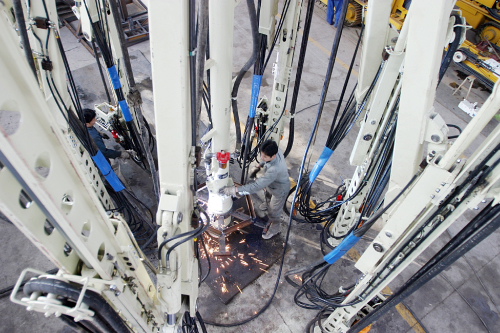|
 |
|
HELPING THE LITTLE GUYS: Staff members of a private company test a drilling machine that just comes off the production line in Xuanhua District, Zhangjiakou, north China's Hebei Province (CHEN XIAODONG) |
Shi Hailin, 31, is an investment project manager of a state-owned enterprise living in Beijing. After buying an apartment in the southwest Fourth Ring Road of the capital city in 2012, he became a fangnu, or mortgage slave, burdened with much financial pressure. Recently, Shi breathed a sigh of relief as the country's interest rates were cut for the first time in over two years.
"Beginning in January 2015, the cut means more than 300 yuan ($49) a month in savings for me," he said.
That's not the only way the rate cut affects Shi's life. "I will shift my focus on investment from the money market fund to the stock market, as lower interest rates are bound to create a bullish stock market in the near future," Shi said.
On November 22, the People's Bank of China, the country's central bank, cut the benchmark one-year lending rate by 0.4 percentage points to 5.6 percent and the one-year deposit rate by 0.25 percentage points to 2.75 percent.
"The purpose of cutting the deposit and lending rates is to bring actual interest rates back to a proper level and lower the financing costs facing many enterprises," the central bank said in a statement.
Industry insiders also hailed the move as a boost for the sagging property market, which drags on the broader economy. Some experts, however, say that the move alone is far from enough to make the economy stage a stunning recovery. Other means, such as reducing the reserve requirement ratio (RRR), should be given full play to add liquidity to the market.
The long-anticipated rate cut came at a time when the country's economic growth slipped to a multi-month low and a flagging property sector is posing an increasing threat to the broader economy.
China's economy clocked its lowest quarter in more than five years in the third quarter of the year, with the GDP growth rate sliding to 7.3 percent from 7.5 percent in the second quarter.
Analysts say cutting interest rates shows the government wants to put stimulus into place to prevent further slowdown.
"It's absolutely the right thing to do," said Wang Tao, Chief China Economist at UBS AG in Hong Kong. "Real interest rates have moved up significantly with slowing growth and inflation, which hurts corporate cash flow and balance sheets. It also threatens to increase non-performing loans."
Who will benefit?
The interest rate cut seems designed to stimulate loan demand and prevent the slowdown in China from worsening, said Bill Adams, a senior international economist for PNC Financial Services, in a research note.
"Cutting interest rates is a way for Chinese economic policy to cushion the impact of slower economic growth without reopening the credit floodgates," he said.
The interest rate cut will help lower the financing costs for businesses, especially small and micro ones that have received the heaviest blow from the current slowdown.
"The cut will help lower financing costs systematically at the start of next year, especially those for small businesses, the farming sector and real estate sector," said Lu Zhengwei, chief economist at the Industrial Bank.
"China has done a lot to address corporate financing difficulties this year, such as cutting the RRR for certain banks, but cutting interest rates is the most direct way to bring down costs," said Wang Jun, a senior economist with the China Center for International Economic Exchanges.
Zhao Qingming, chief analyst of the Institution of Financial Derivatives of China, said that the asymmetric interest rate cut will narrow the profit margins of banks and help shift part of the banks' profits to companies.
"The profits of banks are much higher than average profits in the larger economy. From the perspective of China's long-term economic development, banks must portion part of their profits to the real economy and find new ways of generating profits," Zhao said.
The interest rate cut is set to become another major boon for the sluggish property market, following the easing of mortgage rules on September 30, and will fuel demand, analysts claim.
| 